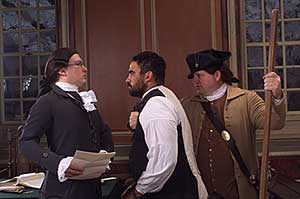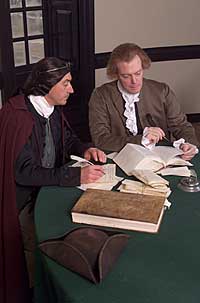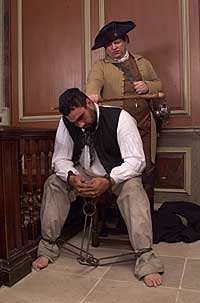Page content
A Patriot, a Traitor, and a Bill of Attainder
Text by Jack Lynch
Photos by Dave Doody
It shall be lawful for any person with or without orders, to pursue and slay the said Josiah Philips. . . . - Thomas Jefferson

Dave Doody
Attorney General Edmund Randolph, outlaw Josiah Philips, and the James City County sheriff portrayed by Daniel Marshall, Ted Bascano, and Tom Hay
In the past few months, America has been asking itself when, if ever, it might be permissible to deprive people of their civil liberties in the interest of national security. It’s not the first time. The Revolutionary generation had to wrestle with the problem often, and the answers were sometimes surprising. In 1778 Thomas Jefferson, a champion of individual freedom, committed what strikes us as a shocking violation of due process by drafting a bill of attainder.
A bill of attainder is a legislative, as opposed to a judicial, conviction of a capital offense. When a parliament or congress declares a person guilty of a high crime, circumventing the due process provided by the courts, the target is said to be “attainted.” He is culpable of felony or treason in the eyes of the government, without opportunity to defend himself at trial, and his property is seized. Since the bill outlaws people, not actions, it can convict persons who violated no laws at all. As the Queen of Hearts said in Alice in Wonderland, “Sentence first-verdict afterwards.”
The importance of due process and ordinary judicial proceedings was paramount when the Revolution began. Virginia’s Bill of Rights, adopted in 1776, provided
that in all capital or criminal prosecutions a man hath a right to demand the cause and nature of his accusation, to be confronted with the accusers and witnesses, to call for evidence in his favor, and to a speedy trial by an impartial jury of his vicinage, without whose unanimous consent he cannot be found guilty, nor can he be compelled to give evidence against himself; that no man be deprived of his liberty except by the law of the land or the judgement of his peers.
But Jefferson’s bill of attainder, written two years later and passed by the new state’s General Assembly, put a man beyond the protection of the courts and compassed his execution on sight.
Attainder had a long history in English law, the law upon which Britain’s colonies modeled theirs. In 1397, Parliament attainted Thomas Haxey for criticizing King Richard II. Another attainder bill was passed against Jack Cade, who led an uprising on London in May 1450. In Shakespeare’s chronicle of the rebellion, 2 Henry VI, Cade’s associate Dick the Butcher announces his plans: “The first thing we do, let’s kill all the lawyers.” In life, it was the lawyers who had the last laugh: in 1451, a year after Cade’s death, lawmakers passed a bill of attainder to seize his property and, consequently, through “corruption of the blood,” to disinherit his heirs.
Not all bills of attainder were aimed at upstarts like Haxey or rebels like Cade. Many were directed at high-ranking officials or advisers who had become too powerful or presumptuous. Henry VIII saw attainder as a useful royal weapon. Charles I, on the other hand, was bullied by Parliament into signing a bill of attainder against his favorite, the Earl of Stafford, in 1641. Charles II’s illegitimate son, the Duke of Monmouth, was likewise brought down by a bill of attainder.
There were occasional complaints about their unfairness, but most people accepted the acts without serious question. Sir William Blackstone, the great eighteenth-century English jurist, had no reservations:
When it is now clear beyond all dispute, that the criminal is no longer fit to live upon the earth, but is to be exterminated as a monster and a bane to human society, the law sets a note of infamy upon him, puts him out of its protection, and takes no farther care of him than barely to see him executed.

Dave Doody
Patrick Henry and Thomas Jefferson, in the persons of Richard Schumann and Bill Barker, drafting a bill
The Baron de Montesquieu, another scholar of the law, was also comfortable with depriving someone of liberty by fiat “in order to preserve it for the whole community. . . . There are cases in which a veil should be drawn for a while over liberty.” In A Discourse concerning Treasons, and Bills of Attainder, Richard West, later lord chancellor of Ireland, called attainder “not only just, but legal, and even in some Cases absolutely necessary to preserve our Constitution.”
But the tide was turning, and over the course of the eighteenth century attainder was used less often: England’s Parliament passed its last one in 1798 against the rebel Lord Edward Fitzgerald.
One eighteenth-century English legal scholar declared all attainders “in their own Nature unjust” and said, “The Law of England is every Man’s Inheritance. . . . Every Man therefore has reason to conclude all his Actions to be (if not justifiable) at least unpunishable, so long as the Law does not take hold of them.” In other words, a person could be called to account for his conduct only by laws already on the books and not by a statute passed afterward to punish him specifically.
This was the environment in which the new American states considered the validity of attainder. Maryland was the first to discard it: the constitution of 1776 ordered that “no law to attaint particular persons of treason or felony ought to be made.” Massachusetts and Vermont followed suit.
To jump ahead of Jefferson’s bill a bit: Alexander Hamilton agitated against attainder and in January 1784 railed at “the doctrine of disqualification, disfranchisement and banishment by acts of legislature. The dangerous consequences of this power are manifest.” He said that it could lead to “an aristocracy or an oligarchy,” in which “no man can be safe, nor know when he may be the innocent victim of a prevailing faction.”
When the Constitutional Convention of 1787 took up the question, all agreed attainder had to go. The ban on attainder and ex-post-facto-—after the fact-—laws was introduced by Elbridge Gerry and James McHenry on August 22. Several participants hesitated over the provisions on ex-post-facto legislation; Gouverneur Morris, Oliver Ellsworth, and James Wilson called them unnecessary and wrangled over their scope. It passed on a divided vote. The clause on attainder, however, sailed through nemine contradicente-—with no objection.
Article I, Section 9, Clause 3, is explicit: “No Bill of Attainder or ex post facto Law shall be passed.” Section 10 expands the scope of the prohibition to state governments. These clauses appear in the body of Constitution, not in the appended Bill of Rights. The need of a fundamental safeguard against bills of attainder was plainer to the delegates than the bans on self-incrimination and illegal search and seizure forced on them by the states during ratification.
But few people today know the meaning of what struck the writers of the Constitution as so disturbing. One legal scholar has called these “probably the hardest clauses in the Constitution for a non-lawyer to understand.” In fact they’re not difficult to explain. An ex-post-facto law punishes a person for an act that was lawful when it was done. A bill of attainder is an act that inflicts death on a person supposed, without benefit of trial, to be guilty of grave offenses.
No constitutional delegate argued for bills of attainder, but the practice wasn’t unheard of in America; in fact, they were more common in Revolutionary America than they ever were in England. Pennsylvania attainted nearly 500 Tories for high treason in 1776. New York passed a famous bill on October 22, 1779: fifty-nine loyalists-including two former governors, Lords Tryon and Dunmore, and other high-ranking colonial officials-were declared guilty of having “voluntarily been adherent” to George III, “with Intent to subvert the Government and Liberties of this State.” New York’s constitution had outlawed bills of attainder, but made an exception for crimes “committed before the termination of the present war,” thereby authorizing more than a thousand attainders during the Revolution.
The most notorious American bill, though, was written by one of the most famous advocates for restricting governmental power.

Dave Doody
In close custody, Philips endures irons and the sheriff’s indignities.
In his first inaugural address, Thomas Jefferson listed “trial by juries impartially selected” as one of the essential American liberties, and in 1783 he proposed a new Virginia constitution outlawing “any bill of attainder, (or other law declaring any person guilty) of treason or felony.” And yet only five years earlier, he had been instrumental in passing just such a bill.
In 1777, Josiah Philips, a Tory laborer, began plundering southeastern Virginia and terrifying the citizens with arson and murder. In May 1778, Governor Patrick Henry ordered the militia to arrest “the noted Traitor” and his fifty followers, but the government’s forces were routed, and Philips and his men went into hiding. Henry turned to Jefferson-a General Assembly delegate from Albemarle County-who called for a bill of attainder. Jefferson drafted the bill May 28, and introduced it to the legislature the same day. It begins:
Whereas a certain Josiah Philips labourer of the parish of Lynhaven and county of Princess Anne together with divers others . . . have levied war against this Commonwealth, . . . and whereas the delays which would attend the proceeding to outlaw the said offenders according to the usual forms and procedures of the courts of law would leave the said good people for a long time exposed to murder and devastation. Be it therefore enacted by the General assembly that if the said Josiah Philips his associates and confederates shall not on or before the last day of June in this present year render themselves to the Governor . . . then [they] shall stand and be convicted and attainted of high treason, and shall suffer the pains of death.
Jefferson was clear about his reasons: “the usual forms and procedures of the courts of law” would result in delays and leave the public “exposed to murder and devastation.” The threat was enough to make him advocate mob justice, deputizing all the population to serve as summary executioners: “It shall be lawful for any person with or without orders, to pursue and slay the said Josiah Philips and any others who have been of his associates or confederates.” Even “associates or confederates” could be legally executed on the spot.
The legality of this bill was shaky. Still, it passed unanimously May 30 after a third reading.

Dave Doody
The modern Dismal Swamp, with its uninviting dark-watered Lake Drummond, is still wild enough to conceal an outlaw, as it hid Josiah Philips, from the authorities.
As it happened, Philips was captured before the law took effect, and Attorney General Edmund Randolph was uncomfortable with bills of attainder. He tried Philips in a court of law and, not convinced the evidence of murder and arson was strong enough to support a conviction, prosecuted on charges not of treason but of robbery. A jury found Philips and his associates guilty of stealing twenty-eight hats and five pounds of twine-valued at just over two pounds-and, since even petty theft was a felony, they were hanged near Williamsburg in December.
The legal questions, though, did not end with the executions, and the bill’s legacy haunted Henry and Jefferson for years. In Virginia’s debates over the federal Constitution, Henry advocated a bill of rights. Randolph charged him with hypocrisy and reminded the convention of the Philips case, conveniently forgetting that the bill never reached its object:
A man, who was then a citizen, was deprived of his life thus: from a mere reliance on general reports, a gentleman in the House of Delegates informed the house that a certain man had committed several crimes. . . . He was attainted very speedily and precipitately, without any proof better than vague reports. Without being confronted with his accusers and witnesses, without the privilege of calling for evidence in his behalf, he was sentenced to death.
Henry and Jefferson were unrepentant. Henry said that “the enormity of his crimes did not entitle” Philips to “those beautiful legal ceremonies, which are pointed out by the laws.” Jefferson wrote decades later: “I was then thoroughly persuaded of the correctness of this proceeding, and am more and more convinced by reflection.” In a letter of March 12, 1815, he explained how it was supposed to work:
When a person charged with a crime withdraws from justice, or resists it by force . . . a special act is passed by the legislature adapted to the particular case. This prescribes to him a sufficient time to appear and submit to a trial by his peers; declares that his refusal to appear shall be taken as a confession of guilt . . . and pronounces the sentence which would have been rendered on his confession or conviction in a court of law.
It is not quite true that Philips was given “time to appear and submit to a trial by his peers.” The bill had already declared “the usual forms and procedures of the courts of law” would not apply and was clear about the guilt of Philips and his cohorts in its reference to “the treasons, murders and other felonies by them committed.” The arguments about due process aren’t convincing. Jefferson is more consistent when he argues that “society had a right to erase from the roll of its members any one who rendered his own existence inconsistent with theirs; to withdraw him from the protection of their laws, and to remove him from among them by exile, or even by death if necessary.”
Posterity has not agreed, and the case has baffled many later commentators. Julian P. Boyd, editor of The Papers of Thomas Jefferson, is typical. Jefferson’s involvement, he says, “is, to say the least, surprising;” he calls the bill “an extreme violation of TJ’s belief in the principle of the separation of powers of government.”
The country has paid less heed to Jefferson’s example than to Hamilton’s warning of 1784: “Nothing is more common,” Hamilton wrote, “than for a free people, in times of heat and violence, to gratify momentary passions, by letting into the government, principles and precedents which afterwards prove fatal to themselves.”
Jack Lynch, an assistant professor of English at Rutgers University in Newark, New Jersey, contributed to the winter 2001-2002 journal “Poetic License-Ossian: The Greatest Poet Who Never Existed” He is editor, with Paul J. Korshin, of The Age of Johnson: A Scholarly Annual.
